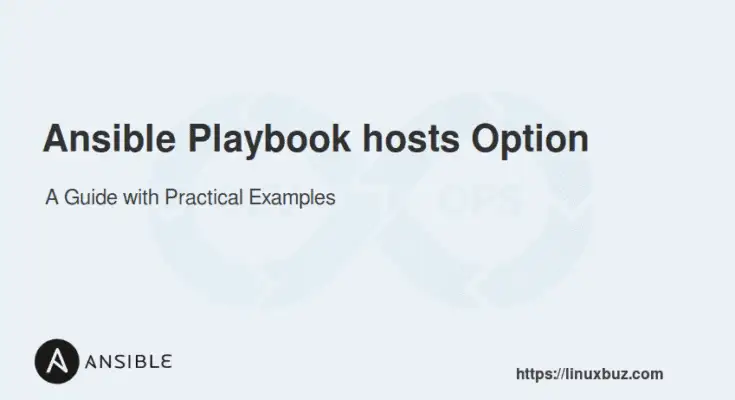Ever wondered how Ansible knows where to run your tasks? That’s the job of the hosts option in your playbooks. Whether you’re deploying updates to your web servers or gathering system information from all your nodes, targeting the right machines is critical.
In this guide, we’ll break down how the hosts option works, explain each use case with real-world examples, and help you avoid common pitfalls.
Table of Contents
What Is the hosts Option in Ansible?
The hosts option in an Ansible playbook defines which servers (or groups of servers) the play should target. These hosts are pulled from your inventory file. You can define a single host, a group of hosts, all hosts, or use patterns to include/exclude specific ones.
Sample Inventory File
Here’s an example inventory.ini to support our playbook examples:
[webservers]
webserver1 ansible_host=192.168.1.10 web_package=nginx
webserver2 ansible_host=192.168.1.11 web_package=httpd
[dbservers]
db1 ansible_host=192.168.1.20
How to Define Hosts in a Playbook
The hosts option can take different values:
- A single host
- A group of hosts
- Multiple hosts
- all (to target all hosts in the inventory)
- Patterns (to include/exclude specific hosts)
Example 1: Run Playbook on a Single Host
In this example, the playbook will run tasks only on webserver1.
---
- name: Install Nginx on a single host
hosts: webserver1
become: true
tasks:
- name: Install Nginx
ansible.builtin.yum:
name: nginx
state: presentExplanation:
- hosts: webserver1 targets a single host named webserver1 from the inventory.
- The task installs Nginx using the yum module.
Example 2: Run Playbook on a Group of Hosts
You can define groups of hosts in your inventory file (e.g., webservers) and run the playbook on all hosts in that group.
---
- name: Update packages on all web servers
hosts: webservers
become: true
tasks:
- name: Update all packages
ansible.builtin.yum:
name: "*"
state: latestIn this example, the play targets all hosts in the webservers group, as defined in the inventory.
Explanation:
- hosts: webservers targets all hosts in the webservers group.
- The task updates all packages to their latest versions.
Example 3: Run Playbook on All Hosts
If you want to run the playbook on all hosts listed in your inventory, use hosts: all.
---
- name: Gather system information from all hosts
hosts: all
tasks:
- name: Display hostname
ansible.builtin.command:
cmd: hostname
register: result
- name: Print hostname
ansible.builtin.debug:
msg: "The hostname is {{ result.stdout }}"Explanation:
- hosts: all targets every host in the inventory.
- The playbook gathers and displays the hostname of each host.
Example 4: Exclude Specific Hosts Using Patterns
Ansible allows for complex host selection using patterns. For example, to target all hosts except those in the dbservers group:
---
- name: Install Apache on all servers except dbservers
hosts: all:!dbservers
become: true
tasks:
- name: Install Apache
ansible.builtin.yum:
name: httpd
state: presentThis pattern selects all hosts in the inventory except those belonging to the dbservers group.
Explanation:
- hosts: all:!dbservers targets all hosts except those in the dbservers group.
- The playbook installs Apache on all non-database servers.
Example 5: Specify Multiple Hosts
You can also specify multiple hosts separated by a colon.
---
- name: Restart services on multiple hosts
hosts: webserver1:webserver2
become: true
tasks:
- name: Restart Nginx
ansible.builtin.systemd:
name: nginx
state: restartedExplanation:
- hosts: webserver1:webserver2 targets both webserver1 and webserver2.
- The playbook restarts the Nginx service on these two hosts using the systemd module.
Example 6: Using Host Variables
You can use host variables in your playbook to customize tasks based on the target host.
---
- name: Install software based on host variables
hosts: webservers
become: true
tasks:
- name: Install web server package
ansible.builtin.yum:
name: "{{ web_package }}"
state: presentExplanation:
The web_package variable can be defined in the inventory file for each host.
For example:
[webservers]
webserver1 web_package=nginx
webserver2 web_package=httpdThis allows the playbook to install different packages on different hosts.
Example 7: Using localhost for Local Execution
You can use localhost to run tasks on the Ansible control node itself.
---
- name: Run tasks on localhost
hosts: localhost
tasks:
- name: Display disk usage
ansible.builtin.command:
cmd: df -h
register: disk_usage
- name: Print disk usage
ansible.builtin.debug:
var: disk_usage.stdoutExplanation:
- hosts: localhost targets the local machine where the playbook is being executed.
- The playbook displays the disk usage of the local machine.
Conclusion
The hosts option is a powerful way to define which machines your Ansible playbooks will target. It allows for flexible and dynamic automation across different environments.
For more in-depth guides and practical examples on Ansible, visit Linuxbuz.
FAQs
1. What does the hosts option in Ansible playbooks do?
The hosts option specifies which target systems the playbook tasks will run on.
2. Can I use multiple groups in the hosts option?
Yes, you can specify multiple groups or hosts using a comma-separated list, like webservers,dbservers.
3. How do I limit playbook execution to a specific host?
Use the --limit option, e.g., ansible-playbook playbook.yml --limit web1.
4. Can I use an IP address directly in the hosts option?
Yes, you can specify an IP address directly, like hosts: 192.168.1.10, without needing an inventory file.
5. What is the purpose of ansible_host in the inventory file?
The ansible_host variable defines the actual IP address or hostname of a target system if it differs from the inventory name.




